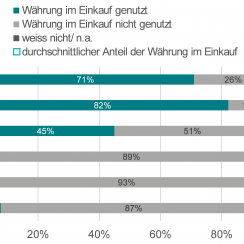Uncertainty characterized the operating cycle
In many respects, 2020 was a bit of a roller coaster for Swiss companies. In view of the high level of macroeconomic uncertainty and the wide fluctuations in some parts of the foreign exchange market, currency hedging played a key role for companies.
A total of 1,088 companies, the most of which are active internationally, took part in Credit Suisse's annual FX survey. This showed that hedging ratios did not increase last year despite the COVID-19 pandemic. You will find interesting information about hedging currency risks and exchange rate and economic developments in this year's Credit Suisse study on FX developments.
FX survey 2021 – exchange rate forecasts
The Credit Suisse study on the handling of currency risks, which also contains exchange rate forecasts, provides an overview of the exchange rates Swiss companies are expecting and how systematically they hedge against currency risks. The comprehensive report also includes interesting business profiles of three clients and expert views on foreign exchange risks and the economy.
Get the study on the development of exchange rates here
Great uncertainty regarding exchange rate developments
If we look at the development of the Swiss economy, the opinions of the companies surveyed are divided. Because, while 44% expect economic growth to pick up in 2021, the majority believes that economic performance will remain stable or that Switzerland could even fall into recession.
The great uncertainty of recent months is also reflected in exchange rate forecasts. The forecasts for the EUR/CHF exchange rate range from under 0.85 to 1.20. However, the majority of respondents do not expect the euro to appreciate. By contrast, the respondents believe that the weakness of the dollar is likely to become less pronounced.
Euro clearly the most important foreign currency
The euro zone is still the most important trading partner for companies that import and export, which include most of those participating in the survey. More than 80% of the corporate clients surveyed do at least part of their purchasing in euros. That makes the euro even more important for sourcing than the Swiss franc. Although the Swiss franc is more important for sales, here too the euro is still the dominant foreign currency, followed by the US dollar.
Exporters hedge less against foreign exchange risks
Companies that do business in various currencies face major challenges. For example, exchange rate fluctuations can cause significant variations in profits and losses on the balance sheet of a company such as ArrowMetals and Trading AG.
Among import companies, 47% hedge their foreign exchange risks. By contrast, companies in the export sector do not hedge as systematically as those in other areas. Only 35% of export companies hedge their currency risks according to Credit Suisse's FX survey.
Uncertainty does not increase the hedging ratio
Overall, around 40% of the companies surveyed stated that they hedged their currency risks, with the hedging ratio among these companies averaging around 60%. The majority of respondents have not increased their hedging ratios since the outbreak of the COVID-19 pandemic. Looking back at the turbulence of the pandemic, this is surprising.
On the one hand, the fact that companies have not increased the hedging ratio is due to some of the companies being fully hedged against foreign currency risks before the crisis. But the role of increased flexibility in a volatile environment should not be underestimated. Givaudan SA also wants to remain flexible so that it can respond quickly to the changing economic environment. Both Givaudan and ArrowMetals and Trading AG are profiled in the study.
Well protected when exchange rates are volatile
As foreign currencies such as the euro and US dollar are of great importance both in the purchase of intermediate inputs and the sale of products or services, companies need to protect themselves effectively against price fluctuations – because the foreign exchange market is likely to be characterized by a high level of volatility next year, too. In the study, Credit Suisse experts explain how companies can find the right strategy for hedging currency risks.
Would you like to find out more about currency hedging?







